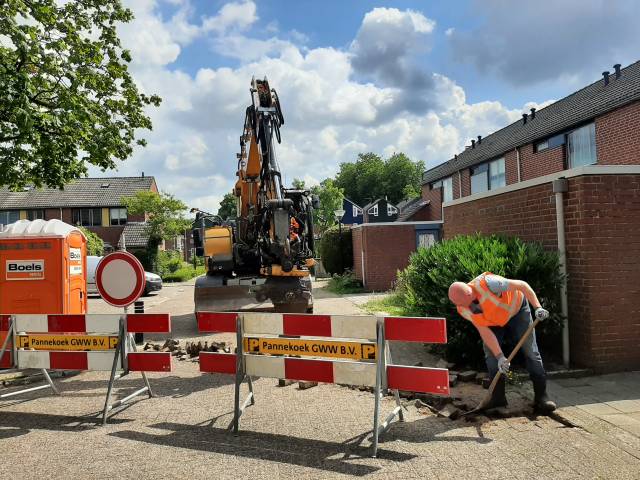Apeldoorn is taking a circular approach to renovate Griffiersveld, a residential street in the district of De Maarn. The city has found that actively involving the contractor in this process is hugely beneficial and more efficient, as market parties can complement the circular knowledge of municipalities. The Municipality is doing this work in the context of the EU-funded CityLoops project.
Throughout the project the aim is to reuse as many materials and resources as possible. For example, most of the removed clinkers and stones have been repurposed in a nearby farm compound or brought to a municipal material depot allowing the city to use them in other construction projects. Some stones were crunched and placed in parking spots. In addition, the project didn’t use any new sand, and brought waste water to a water catchment, allowing the water to be infiltrated into the ground, instead of turning into pools on the street.
As Adriaan Hellemans, Apeldoorn’s demonstration manager in the context of the CityLoops project notes, the municipality’s dialogue with the contractor greatly contributed to the success of this circular approach. He explains that the market parties often has more experience with circularity than municipalities, as saving resources and materials comes more naturally to them. In the case of Griffiersveld, it was the contractor who found a way to save the sand and to reuse materials in other places of the neighbourhood.
Based on this experience, Hellemans calls to involve the market as early as possible in projects like these, potentially even before the procurement process starts, for example through a market dialogue or an open marker consultation. And once the procurement is done, and the contract is signed, municipalities need to take an active approach towards contract management, that is about more than just following the terms of the contract. It requires an active dialogue with the supplier.
Hellemans emphasies while such proactive relationship management may take a bit more work, in the end it also has a lot more benefits for all stakeholders. Close cooperation with the market gives municipalities, often quite traditional organisations, better access to innovative solutions, and helps increase work capacity. Suppliers get better insights into what their client wants, a bigger stake in the project and more insight into how the financial and environmental impact of their work are intertwined. In the case of Griffiersveld, the municipality of Apeldoorn wanted to minimise unnecessary transport movements and gas use and asked the contractor for weekly reports. That gave the supplier a good overview of the real cost of their work, allowing them to better understand how to save more energy and money.
Beyond the financial and environmental benefits, the good cooperation between the municipality and the contractor also led to happier residents. The contractor made sure to inform the affected inhabitants of every step in the project and worked in such a way to reduce any inconveniences as much as possible. Moreover, circular, environmentally friendly projects such as this one also lead to less noise and smell pollution, making citizens more aware of the benefits of sustainable approaches.




